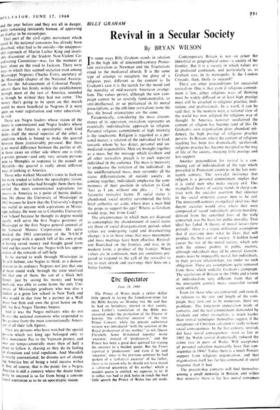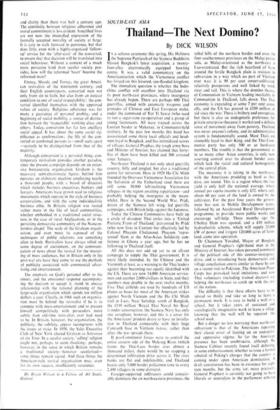BILLY GRAHAM
Revival in a Secular Society
By BRYAN WILSON
IN some ways Billy Graham stands in relation to the high tide of nineteenth-century Protes- tant revivalism as Newman and the Tractarians stood to the mediaeval church. It is the same type of attempt to recapture the glory of a religious past, different as the content is. In Graham's case it is the search for the mood and the morality of mid-western American evange- lism. The values persist, although the new cam- paign cannot be so severely fundamentalist, so anti-intellectual, or so puritanical in its moral prescriptions, as the old-time revivalism; none the less, the broad orientations are the same.
Paradoxically, considering the mass circum- stance of its operation, revivalism represents an essentially individualistic approach to religion. Personal religious commitment of high intensity is the touchstone. Religion is regarded as a per- sonal matter, a relation of the individual to God, towards whom he has direct, personal and un- mediated responsibility. Men are brought together as a mass, but the message which Graham and all other revivalists preach is to each separate individual in the audience. The mass is necessary to emphasise the isolation of the individual: in the undifferentiated mass, men surrender all the status differentiations of outside society; in coming together, individuals emphasise the com- monness of their position in relation to God. 'Just as I am, without one plea . . .' is the favourite revivalist hymn. If social status is abandoned, social identity surrendered, the little brief authority set aside, where does a man find the props to support his ego? Where. as Graham would urge, but from God?
The circumstances in which men are disposed to contemplate the abandonment of social status are those of social disorganisation, periods when values are undergoing rapid and disconcerting change: it is in those times that mass movements and mass meetings have been effective. Revival- ism flourished on the frontier, and was, in its modern form, a product of the frontier. When values are in confusion, men are sometimes pre- pared to respond to the call of the revivalist to try to start afresh and rearrange their lives on a better footing.
Contemporary Britain is not—in either the industrial or geographical sense—a society of the
frontier. But it is a society in which values are in profound confusion, and particularly so, as Graham sees, in its metropolis. Is the London Crusade, then, likely to succeed?
There are other preconditions for successful revivalism. One is that even if religious commit-
ment is low, either religious ways of thinking
must be widely diffused or at least high prestige must still be attached to religious practice, insti-
tutions and professionals. In a word, it can be
said that, in the modern west, a rational view of the world has now eclipsed the religious way of
thought. In America, however secularised the content of religion has become (and of this Dr Graham's own organisation gives abundant evi- dence), the high prestige of religious practice persists. In Britain. where the content of religious teaching has been less dramatically secularised, religious practice has become marginal to the way of life of the society, enjoying little prestige and less support.
Another precondition for revival is a con- tinuing cult of individualism of the type which prevailed in Protestant countries in the late nine- teenth century. The revivalist insistence that religion is a personal commitment implies that it is sinful men who make society evil. This evangelical theory of society stands in sharp con- trast with the socialist assertion that injustice in the social structure causes men to be evil. The nineteenth-century evangelical ideal was that decent societies would arise where they were composed of 'saved' individuals; private morality, derived from the sanctified lives of the truly converted, was the basis for public morality. That ideal has faded. A theory of moral laissez-faire prevails: there is a vague utilitarian assumption that if everyone does what he likes, that will produce the best sort of society. A hidden hand causes the rise of the moral society, which acts with the utmost probity in public matters, although individuals may all be amoral. Govern- ments must be impeccably moral, but individuals, in their private relationships. are under no such obligation. These are assumptions quite removed from those which underlie Graham's campaign. The secularism of Britain in the 1960s and a form of individualism very different from that of the nineteenth century make successful revival seem unlikely.
Even for those who are converted, and even if, in relation to the size and length of the cam- paign, they turn out to be numerous, there are problems. The long-term expectation made of converts, and the real commitment demanded by Graham and other evangelists, is much harder than revival techniques themselves suggest, if the acceptance of Christian salvation is really to have social consequences. In the last century. revivals did have moral consequences -even as late as 1905 the Welsh revival dramatically reduced the crime rate in parts of Wales. Will acceptance of personal salvation necessarily have that con- sequence in 1966? Today there is a much flimsier support from religious organisation, and that organisation itself has far less command of social response than it had.
The present-day converts will find themselves among a small minority in Britain, and within that minority -there is far less moral consensus
and clarity than there was half a century, ago. The continuity between religious adherence and moral commitment is less evident. Sanctified lives are not now the intensified expression of the formally accepted morality of society at large. It is easy to walk forward in penitence, but that does little, even with a highly-organised 'follow- up' service for the 'after-care' of the converted, to ensure that that decision will be translated into social behaviour. Without a context of a much more pervasive kind than secular society pro- vides, how will the reformed 'heart' become the reformed man?
Finney, Moody and Torrey, the great Ameri- can revivalists of the nineteenth century, and their English counterparts, converted men not only from sin to faith, but also from an outcast condition to one of social respectability: the con- verted identified themselves with the approved values of society. Religious adherence was for many a guarantee of personal probity, and a beginning of social mobility, a source of distinc- tion between the 'respectable' working class and others. Today, conversion has far less ancillary social appeal. It has about the same social sig- nificance as confirmation : the life of the con- verted or confirmed persons is—small sects apart —scarcely to be distinguished from that of the majority.
Although conversion is a personal thing, con- temporary revivalism provides another paradox, since the present campaign depends on an exten- sive bureaucratic organisation. Graham is the necessary semi-charismatic figure; behind him operates an elaborate machine employing nearly a thousand people. with a board of directors which includes business executives, bankers and lawyers. Americans have grown used to religious movements which operate in the style of business corporations, and with the same individualistic business ethic. In Britain, religion was rooted rather more in the life of local communities, whether embedded in a traditional social struc- ture in the case of rural Anglicanism, or in the persisting democratic community of the Noncon- formist chapel. The scale of the Graham organi- sation, and even more its espousal of the techniques of public relations, are something alien to both. Revivalists have always relied on some degree of excitement, on the communi- cation of news about the revival for the muster- ing of mass audiences, but in Britain only in the post-war era have they come to use the _methods of publicity associated with commercial adver- tising and entertainment.
The emphasis on God's personal offer to the sinner, and the emotional response accompany- ing the decision to accept it. stand in uneasy relationship with the rational planning of the large-scale organisation which spends ten million dollars a year. Clearly, in 1966 such an organisa- tion must be behind the revivalist if he is to compete with mass-entertainment and to present himself competitively with persuaders more subtle than old-time revivalists ever had need to -be. In Britain, however, the organisation, the publicity, the subtlety, appear incongruous with the issues at stake. In 1958. the Sales Executive Club of New York elected Graham as Salesman of the Year. In a secular society, 'selling' religion ought not, perhaps, to seem shocking: perhaps, however, in the sense in which Britain remains a traditional society—however secularised— some things remain sacred. And these things the American-style revival organisation may, even for its own success, insufficiently reverence.
Dr Bryan Wilson is a Fellow of All Souls, Oxford.































 Previous page
Previous page